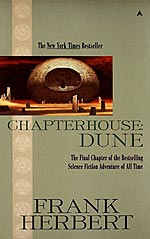
![]() Bormgans
Bormgans
3/12/2022
![]()
People change. 10 years ago I read the Dune series for the first time, and it became my favorite series ever. In 2019 I started my reread of the series, and now I've finally come to the end of that project, finishing Chapterhouse: Dune, the 6th book. 10 years ago, I thought Chapterhouse was the pinnacle of the series -- today, I think it is its nadir, and I would not call the series as a whole a favorite anymore.
In what follows, I will first try to explain why I think Chapterhouse: Dune is the weakest of the bunch. The bulk of this post will be an analysis of the book's main themes, and their relation to the previous books.
For starters an examination of the Bene Gesserit. The main question I still had after reading Heretics was about their intentions, and I'll check how Odrade's emotions play out in Chapterhouse as well. I'll also look into the question of free will again -- the main issue of the first Dune. I've written shorter sections on change & creativity -- change being the series overall constant, on Nietzschean morality -- yet another recurring theme, on the obscure & conflicted nature of Mentats and, finally, on Herbert's obsession with bureaucracy, something that popped up in Heretics already.
Before I wrote my actual analysis, I lined up 85 quotes with a total of 5500 words. Not all of those made the cut, but the text is quote heavy nonetheless. If you don't want to read quotes, just skip them: in most cases, you should be able to follow my reasonings without them.
I'll end with a short assessment of the series in general.
(...)
Full analysis on Weighing A Pig Doesn't Fatten It
https://schicksalgemeinschaft.wordpress.com/2022/03/12/chapterhouse-dune-frank-herbert-1985/